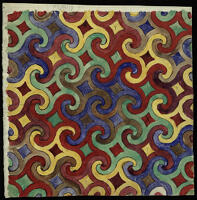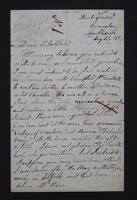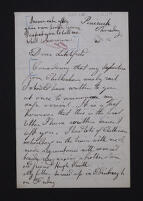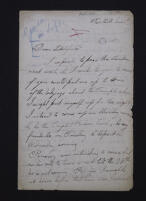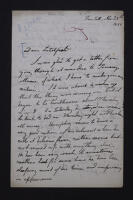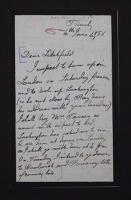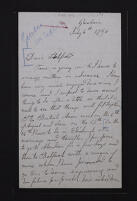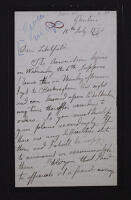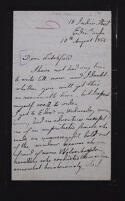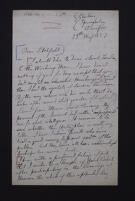Monte Generoso (Mendrisio, Switzerland).—It is very cold. Gives an account of their travels since they left Malta. Refers to a review by Tait. Hopes that the news from Belgium ‘has given all the cardinals the stomach-ache’.
—————
Transcript
Monte Generoso June 16/78
My dearest Fred—Here we are at length, you see; if my writing is illegible, it is not that I tremble, but that I am cold. We certainly did not expect to be sent on an arctic expedition without any lime-juice. It isn’t the temperature that matters so much as the damp, and the house being built without fireplaces. I will however recount all the misfortunes that have happened to us since we left Malta. I supposed that a French boat would be better than an Italian, and so took passage in a Fraysinet; being also tempted by the prospect of going straight to Genoa instead of calling at a lot of hot and malarious Italian towns. The boat was small, crowded and uncomfortable, but would not have been very bad but for the odour of an unfortunate cripple in the next cabin. (If I get confused, remember that it is sunday† morning, and some excellent folks are clacking away to A.G. {1} just outside). We got to Genoa in time for an early fast train which would have taken us to Milan in comfortable time for lunch; but the sanitary authority chose to come at 8 instead of 6 to set us free, for which the Superior Being said he ought to have 4 dozen on the spot. The Superior Being was Major Dudley North, aide-de-camp to the late Gov[erno]r of Malta. After we had given him that name (which he thoroughly deserves) I overheard a little frenchman saying “ce grand anglais n’est pas fait comme les autres parce que les autres sont plus petits”. The S.B. was exceedingly kind to us. He said no people were so obstinate as women and invalids, and it was necessary that some one should give orders and be responsible. He and Mr Magistrate-and-Collector Sharpe, (an old maid on his way home from India, just like Jack when he first comes in in “a terrible villain”) travelled with us as far as Alessandria, and took care of us. Then the government contrived that we should arrive at Milan at half past nine instead of half past seven, and the Lord provided an Italian nobleman for the last two hours who insisted on keeping all the windows open at his end of the carriage. Of course I caught cold being thoroughly worn out by getting up at 6 for the sanitary who didn’t come, and an 8 hours journey. We were at Milan during those damned Xtian festivals so that everything was shut up and Brioschi was away at Rome. Our arrival in Switzerland was the signal for a rainy season which has been bottled up for months. We had to wait a day for the rain at Mendrisio, where we were told that the mule ride up here was very fatiguing[,] especially for those unaccustomed to the animal. So I was persuaded to be carried up in a chair like this. [Alongside is a sketch of a seated man being carried in a litter by two others.] After a little while one learns a peculiar trick of holding on, and then it is not quite so bad. Lucy was on a mule with a stumpy tail, and had the umbrellas and wraps strapped on behind her, so that she looked like Dian stalking to the chase. [Alongside is a sketch of a rear view of a person seated on a mule, with ‘umbrellas and wraps’ strapped behind.] The road is sheltered until the last few steps, when one comes on the open space where the hotel is. That gave me a violent toothache at once. They say Addington Symonds has just been here for a month, and derived enormous benefit; but I suppose God sharpened the wind to the shorn lamb, as usual. The people here can’t remember it so cold as it became yesterday. I went to bed with a jorum of arrowroot gruel, strongly flavoured with brandy, and Georgie’s hot-water-bottle which was an infinite comfort.
Just got your letter and delighted at the prospect it holds out. I saw a proof of Tait’s review which Macmillans sent me—I would rather Clerk Maxwell had done it, because he has more than one idea; Tait divides all mathematical books into those which are friendly or not friendly to the study of quaternions. We have always been on the best of terms; my review of the unseen universe {2} was entirely complimentary to him and Balfour Stewart, and only used the book as a peg on which to hang shots at other things—(good metaphor—wants working up). I am very much better for the news from Belgium, and hope it has given all the cardinals the stomach-ache. The torpedo is protected from sardines: he carries an oil-box in which he packs them when captured, and in this way he pays his way. Love to Georgie & Alice, with many kisses, from
Thy
Willi {3}
—————
{1} i.e. Almighty God. Cf. the second postscript to CLIF A4/13b.
{2} The Unseen Universe, by Balfour Stewart and P. G. Tait (1875). Clifford’s response to this book was published in the Fortnightly Review (new series, vol. xvii, pp. 776-93) and reprinted in Lectures and Essays (vol. i, pp. 228-53).
{3} Reading uncertain. Probably ‘Willi’ altered from ‘Willy’.
